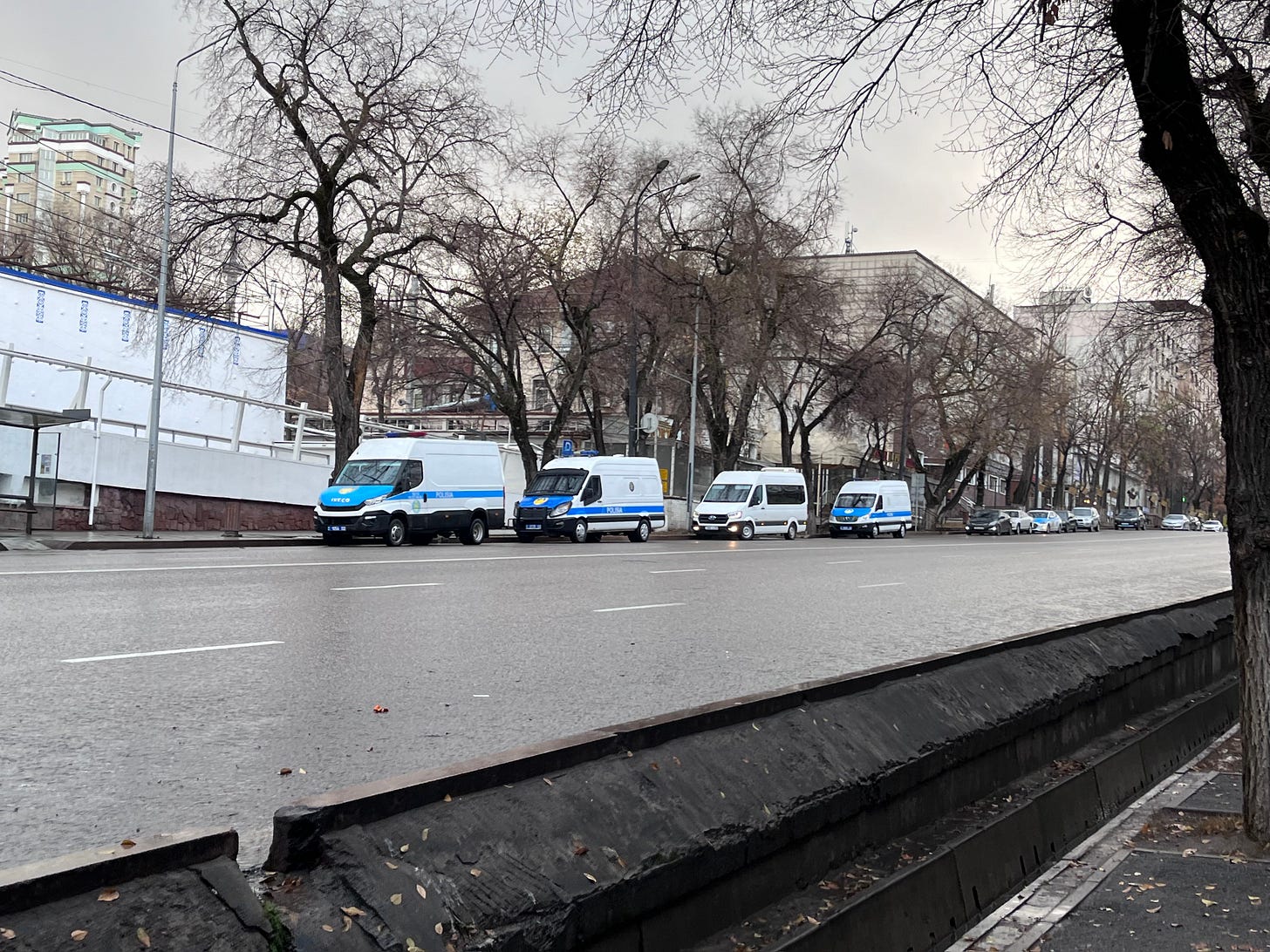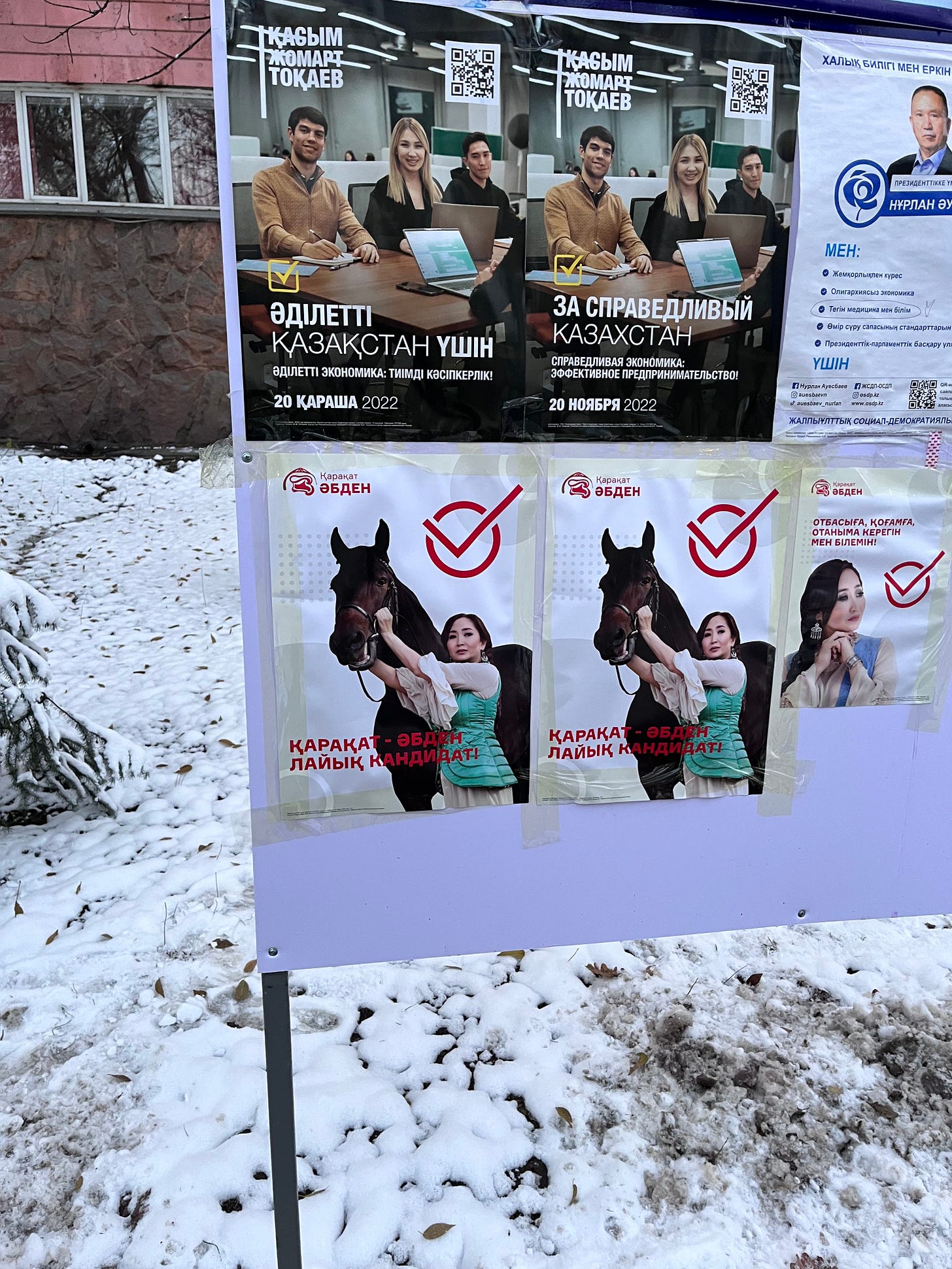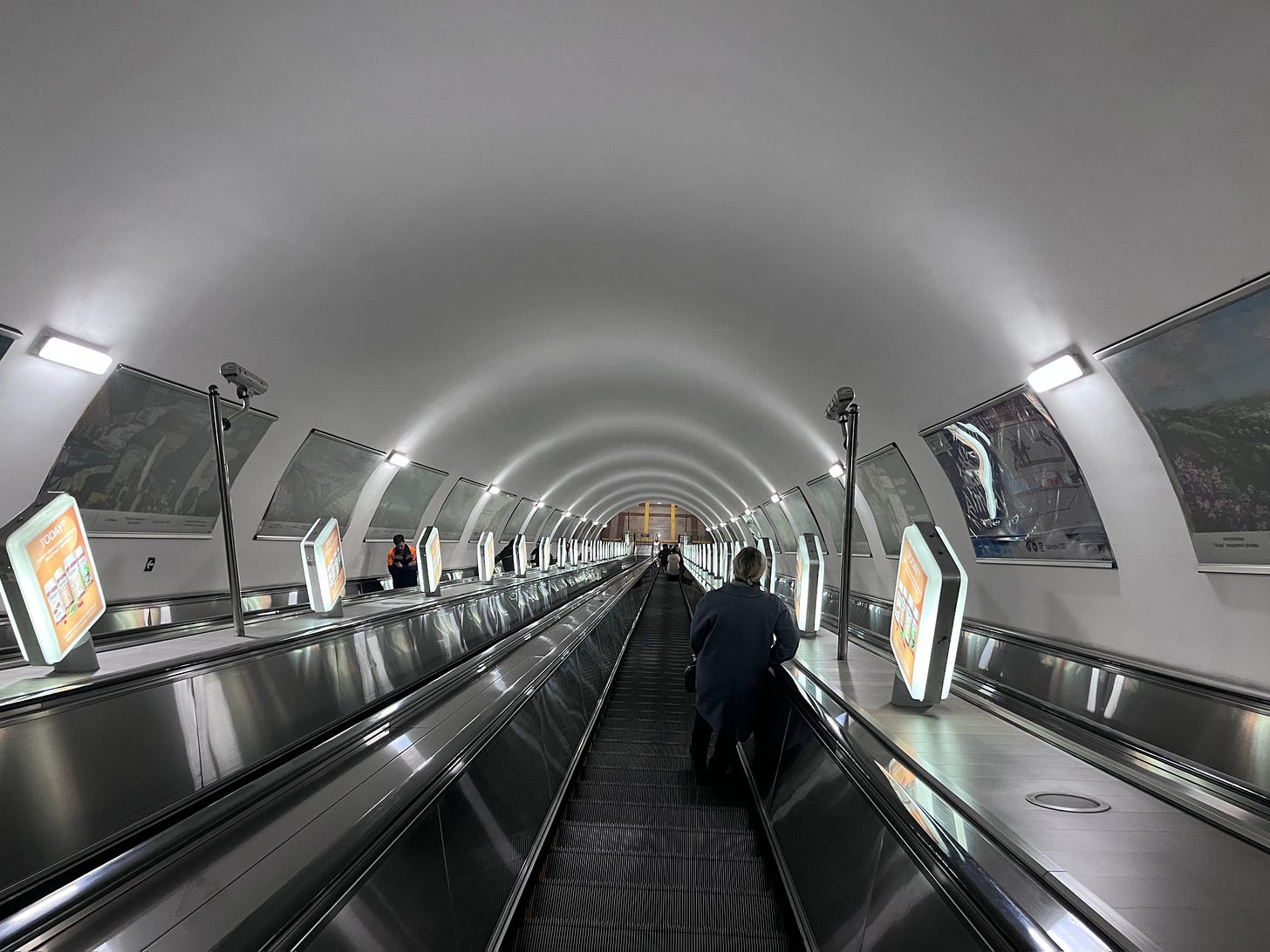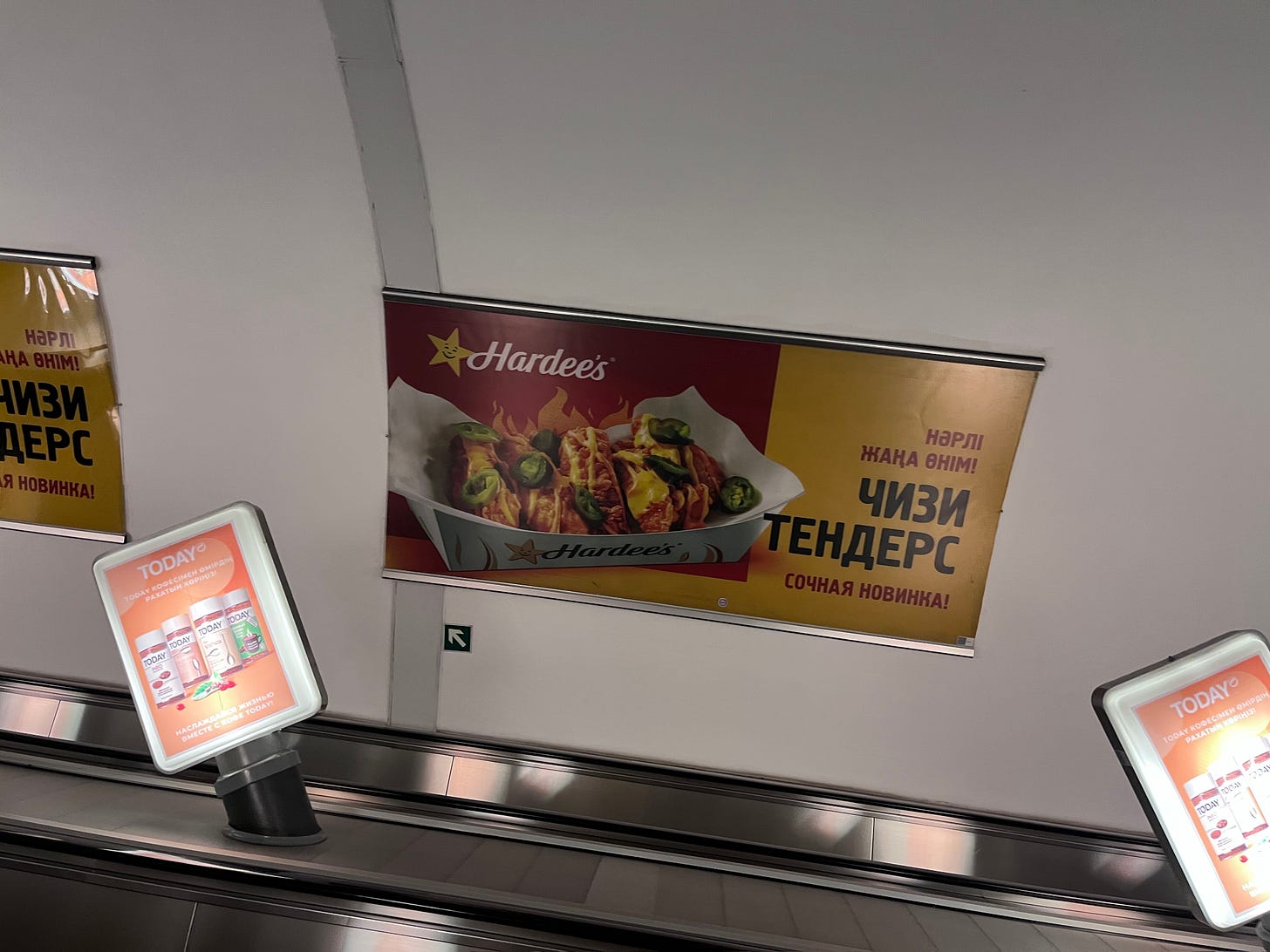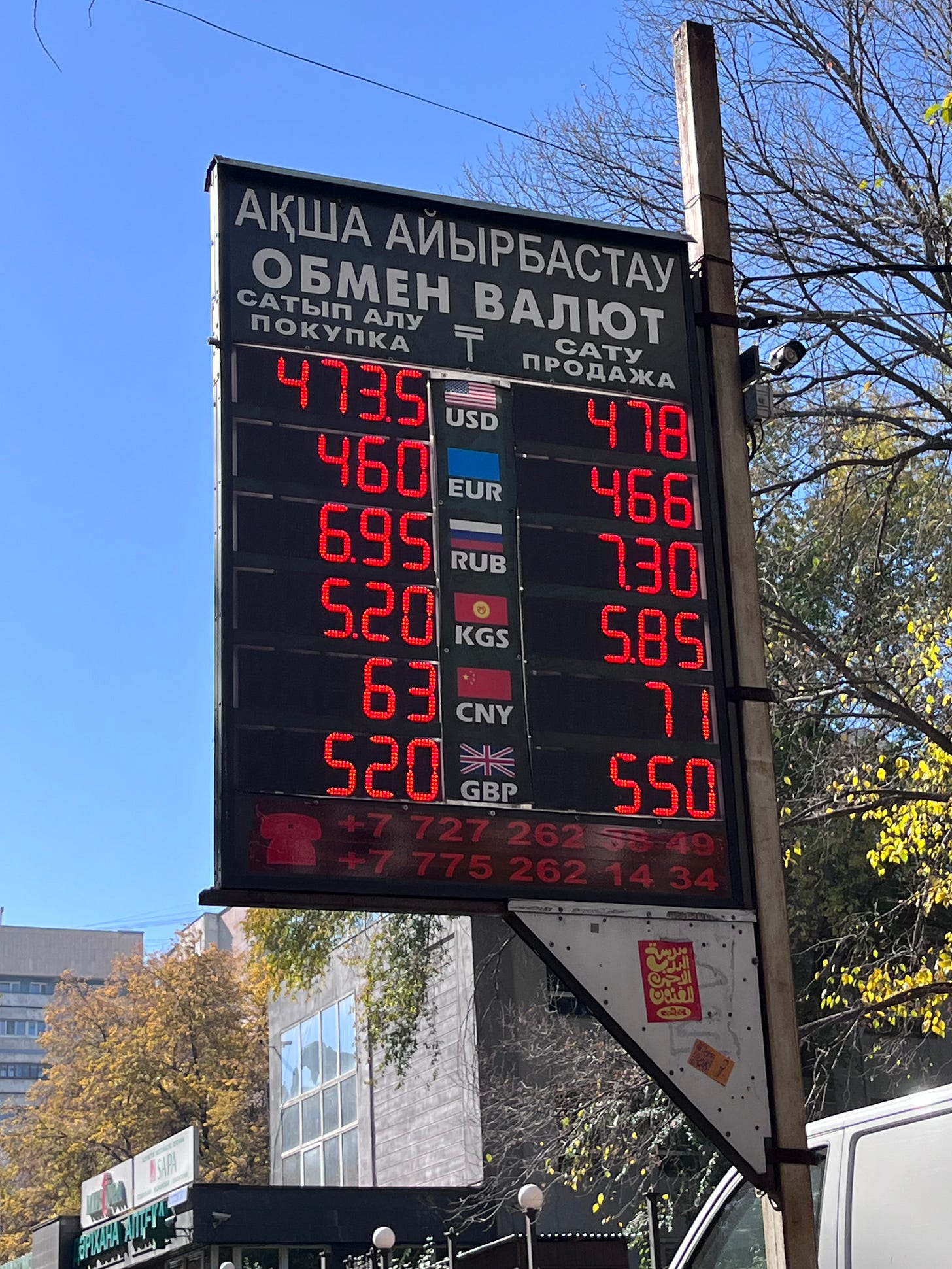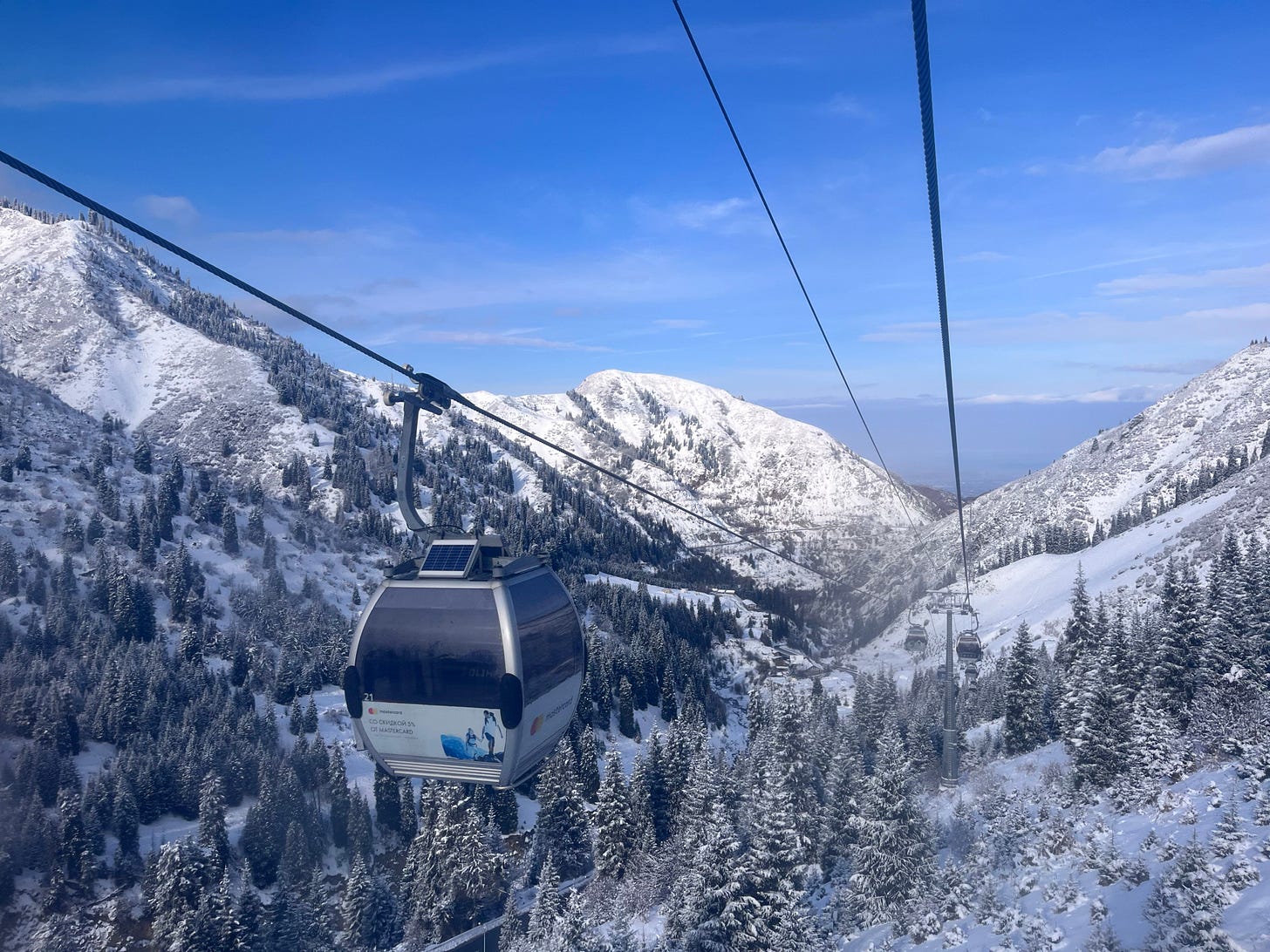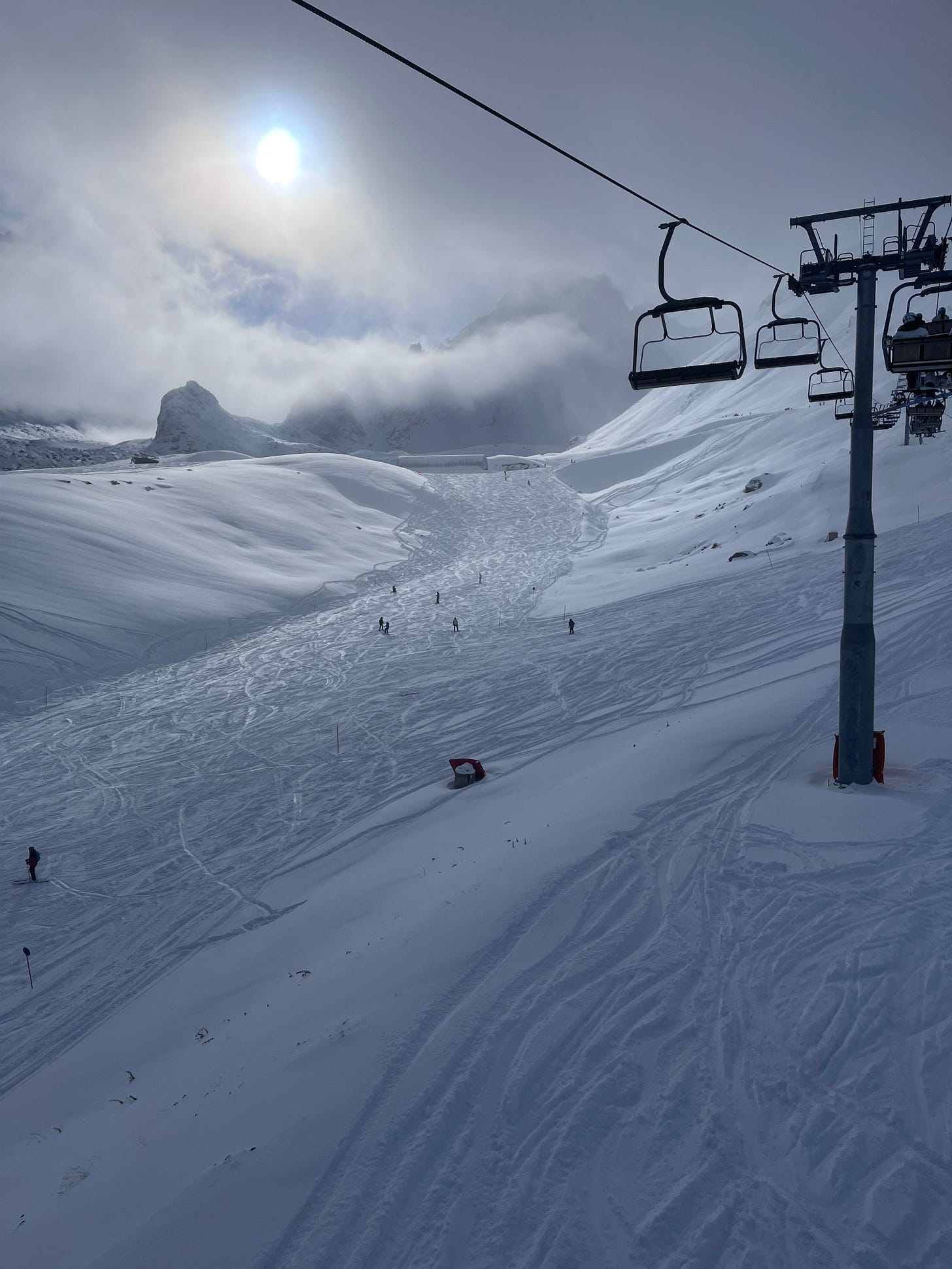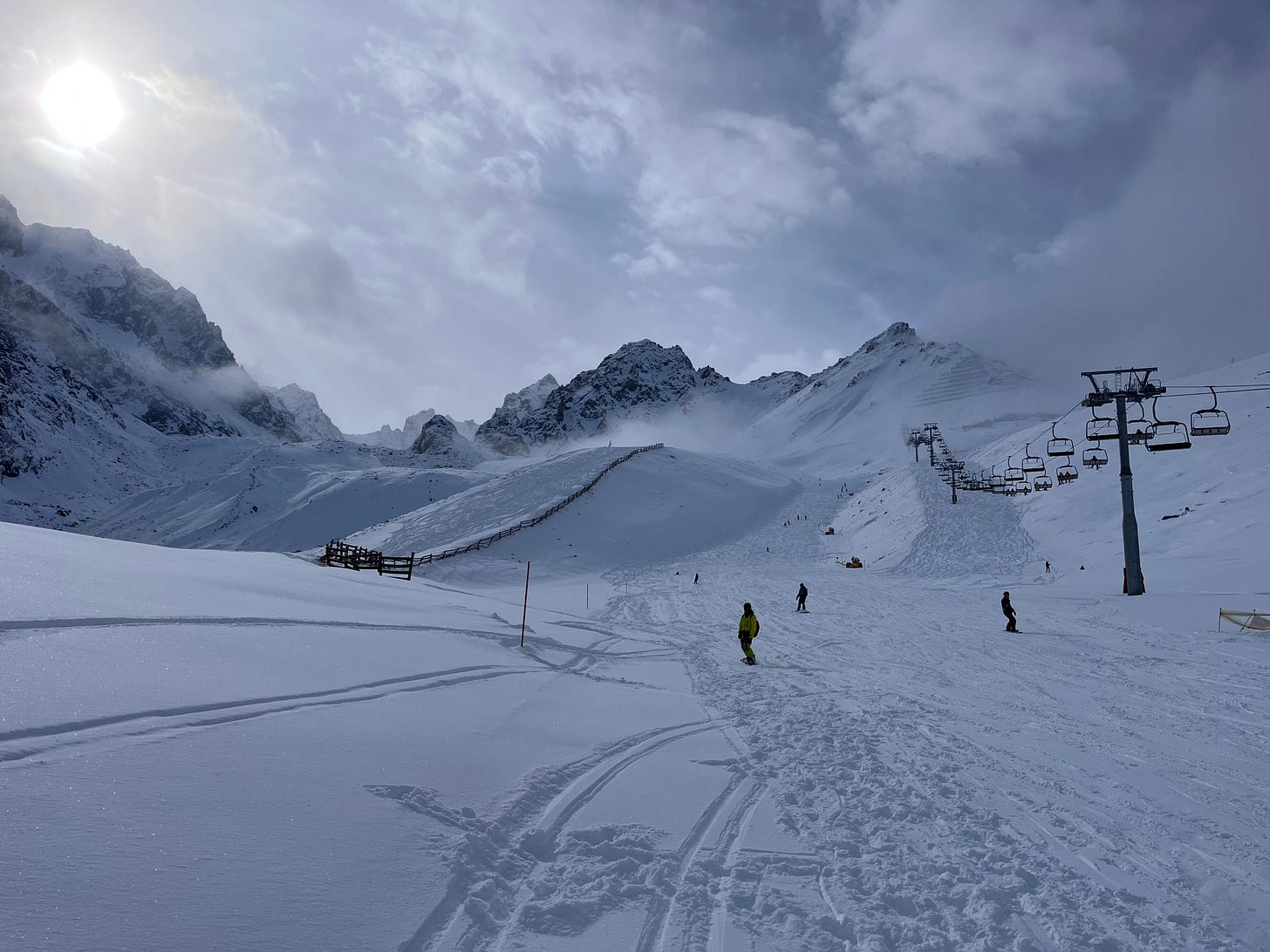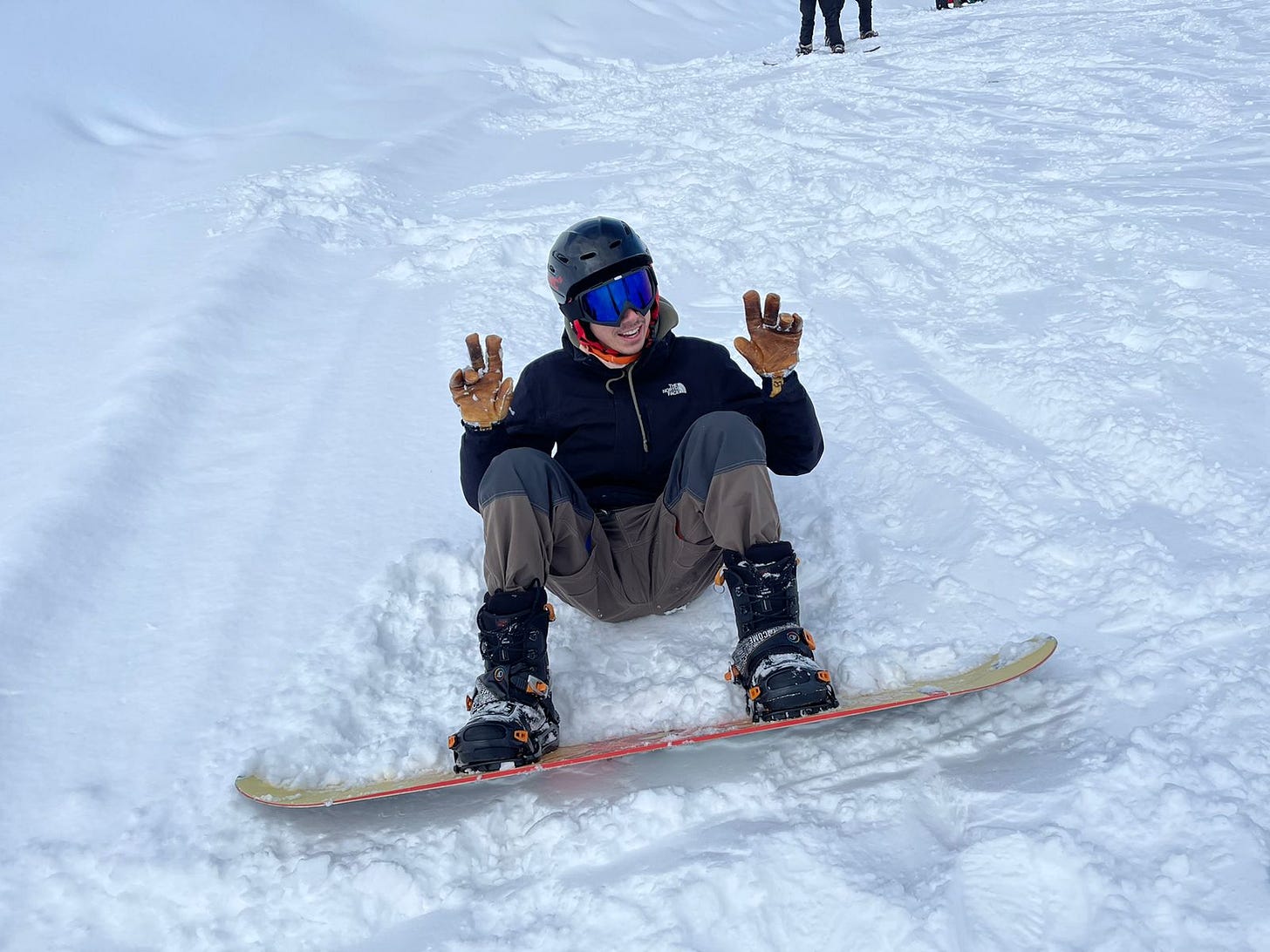In the shadow of empires and mountains
It's coming late and has too many subdivisions
Part I - In the shadow of empires (the part 4 nerdz)
It rained on election day. I left my apartment early, walking down the wet, quiet streets. I wondered if somewhere in Astana (aka Nur-Sultan) there was some campaign manager absolutely losing their mind, obsessing over whether the rain would affect voter turn out. But, as I turned left on Kazybek Bi St., I saw the police on the corner and remembered: rain or shine, Kassym-Jomart Tokayev was going to win the election. The result was guaranteed before polls ever opened.
As promised in the last blog post, I’m going to focus on politics in this one. If that’s not your thing, scroll to part II.
On the first zoom call I had with Princeton in Asia staff about the fellowship, the program director asked me how much I knew about the political situation in Kazakhstan. I told him that I knew very little. He assured me that PiA would never send any fellows to places that they thought were dangerous but Kazakhstan had a tumultuous 2022. Given the events and the history of the country, that may have been a bit of an understatement.
Section 1: A brief history of the strange politics of Kazakhstan
Here’s a short history of Kazakhstan with this big disclaimer: professional historians have almost certainly written monographs that detail all the intricacies of Kazakhstan’s roughly thirty year history— this is obviously not that. I’m going to generalize for brevity and simplicity. Obviously, history is neither brief nor simple, but this is a blog.
Kazakhstan was the last Soviet republic to declare independence in 1991. It hung on until the very end. After declaring independence, Nursultan Nazerbayev, who had served as leader of the Supreme Soviet of Kazakstan from 1990-1991, became the first president of newly-independent Kazakhstan after being elected in an uncontested election. Through a series of snap elections, changes in the constitution, corruption, cronyism, and authoritarian rule, Nazerbayev managed to extend his “presidency” for twenty-nine years.
In 2019, Nazerbayev officially left the presidency. He had been looking to transition away from office since the mid-2010s, but some sporadic protest movements in 2018 accelerated the transition. However, even though Nazerbayev formally left office, he remained the country’s political kingpin. He handpicked his successor, Kassym-Jomart Tokayev. He retained his position as the head of the ruling party, Nur Otan. He continued to serve in key policy-making positions. And, the constitution was amended to give him the permanent title: “Leader of the Nation.” So, basically, even though Nazerbayev wasn’t technically president, Kazakhstan was still his.
Then, January 2022 happened.
The “January unrest” or the “January events” — a bland nickname that illustrates the inherent difficulty of naming revolutionary social movements without revealing your political view on them, see also 2020 Black Lives Matter protests/unrest/riots — may have been the most important events in Kazakhstan’s short history. I’m going to try to detail what exactly happened with another big disclaimer: there may be holes or facts that I’m off on because access to the internet was cut during some of the most violent parts of the January unrest. Almost a year later, researchers still have many questions about what exactly happened, but here’s generally what they think.
Following a new year’s increase in gas prices, protests started in the city of Zhanaozen on January 2nd. The protests soon expanded geographically— moving west to east, eventually coming to Almaty— and topically as more diverse sets of people joined the protests. By January 4th, thousands protested the rising cost of living, economic inequality, low wages, corruption, and the authoritarian-nature of the government. The government tried to crack down on the protests with force, but protests like this had never been seen before in the country’s history. In Almaty, protesters stormed the mayor’s office and set fire to the building. Kazakhstani police fired tear gas, stun grenades, and rubber bullets into crowds. The president gave “shoot to kill” authorization. But the protesters did not disperse.
To put it in the simplest terms, these protests were for real. They posed a legitimate threat to the government’s stability, especially since the Kazakhstani government nearly buckled from the inside at the same time. In response to the protesters’ demands, Tokayev tried to signal his openness to reform by removing Nazerbayev from his appointment as lifetime head of the national security council and dissolving (or accepting the resignation of) his cabinet. The successor turned against his predecessor. Obviously, Nazerbayev wasn’t cool with that— the whole point of being lifetime “Leader of the Nation,” retaining key positions in government, and hand-picking your successor was to retain all your power, not to let your successor run you out of the government.
So, there was some sort of internal power struggle. The details aren’t totally clear— at least to me. Tokayev claims there was an attempted coup led by Nazerbayev and his loyalists. So, Tokayev called on Kazakhstan’s oldest and most powerful ally: Russia. Kazakhstan is a member nation in the Collective Security Treaty Organization (CSTO), which is basically the post-Soviet country’s NATO. The gist is that if a member state is attacked by outside aggressors, then all member states are obligated to come to its defense. The issue with this, of course, was that the protests in Kazakhstan were Kazakhstani citizens protesting their own government. Not to worry though because Tokayev claimed (without proof) that thousands of foreign terrorists had come into Kazakhstan and were instigating protests in Almaty to overthrow the government. So, Russia — and the other members of the CSTO but mostly Russia — sent in troops. These troops technically did not do any fighting; they mostly guarded key pieces of infrastructure in eastern Kazakhstan. However, the backing from the CSTO, and most importantly, Russia sent an important message: Putin was giving his blessing to Tokayev to be the new man in Kazakhstan.
If you eyes glazed over while you read that last section, just know this: there is president #1 (Nazerbayev) and president #2 (Tokayev). President #1 gave power to president #2. The people got mad at president #2 for a bunch of valid reasons, so president #2 said, “hey it was all this guy,” and pushed president #1 out of the government with Russia’s help. Now, we’re all caught up!
After the protests were put down, Tokayev and his government spent the next few months announcing reforms to the constitution. The most notable reform: new presidential terms (seven years), which meant new snap elections were set for this year. According to Majlis, Radio Free Europe’s Central Asia-focused podcast, Tokayev called for these elections to posture as a reformer while consolidating his power with a new mandate from the people.
Of course, the only issue is that, like Nazerbayev, Tokayev’s elections aren’t what Americans would call elections. No real opposition parties are allowed on the ballot. Tokayev didn’t even show up to the debates. All the opposition candidates only criticized each other’s platforms. So Tokayev— spoiler alert — won with around 80% of the vote.
Section 2: Ok cool, I guess… but why do I care?
A few take-aways:
During the Arab Spring, there was so so so much chatter about how technology was going to forever change nation-wide social movements. They called it the Twitter Revolution. They said you could live-tweet a protest and the whole world would watch in real time. They said technology would be used for good and there would be no more authoritarians because we could all take a photo of them and tweet at them and say “hey you’re an authoritarian, now stop or all my followers will see what you’re doing.”
Some of the hype was valid. Yes, smartphones definitely change protests in that they can capture key pieces of video evidence, apps like Telegram let hundreds of people communicate anonymously, and journalists can contact those on the ground from across the world. But, the January unrest shows that technology is less of a fix-all and more of a chess move. It was a good chess move. It made authoritarian governments think, but now they came up with their counter: tightly controlling access to the internet. As I said above, the Kazakhstani government literally turned off the internet during some of the most critical days of the protests. With one flip of a switch — probably not one switch, probably a bunch of servers all over the country or something idk how the internet works— wide swathes of the country went into an internet blackout.Also, Kazakhstan’s internet is already partially censored and certainly monitored. Obviously, the government doesn’t announce which websites it’s censoring, but I’ve talked with some other Americans I’ve met here and exchanged notes. Reddit and twitter seem to be blocked sporadically. Especially during times of potential political unrest, more of the internet seems to be inaccessible.
It seems to me like those who are praising technology as our savior, or the protester’s new best friend, or whatever else, seem to fall into the neo-liberal, “the world is flat” trap.1
Like those lovely neo-liberals do with globalization, technology enthusiasts argue that technology will inevitably link the people of the world together, forcing us to realize that we’re all much more similar than we think, prompting the citizens of the world to hold each other’s iPhone-clutching hands and walk into the sunset. But the January unrest suggests a much more unsettling truth. I would be willing to bet an unspecified yet sizable amount of money that no Americans reading this knew much if anything about these monumental events in Kazakhstan. That’s not because of the internet blackout. American news outlets never put stories about Central Asia near the front page— if they cover them at all. And, the news outlets cater to our perceived interests. In simpler terms: we (Americans) don’t care. We said we cared about technology and revolution during the Arab Spring, but when Kazakhstan erupts, there’s barely a peep.2 As long as Kazakhstan’s political problems stay within the country’s borders, American media won’t waste any column inches (or webpages?) to detail the Kazakhstani politic landscape. That sucks to admit, but I think it’s the truth.While researching the January unrest, I also started to reflect more on the importance of a free, fact-based, comprehensive, and understandable press— I know, stunning, ground-breaking analysis, Jack, the free press is good, wow this substack is hitting. Bear with me for a second. When I was doing more research into what exactly happened in January, I repeatedly went down rabbit holes into internet information overload hell. For example, one article stated that two government security officers were decapitated during the unrest. Wikipedia mentions one security officer was found with his head no longer attached to his body but cites a dead link to an ABC article. I also found an article from the British newspaper The Independent that seemed like it would finally give me a definitive answer, but I ran into a paywall before the article could tell me if one, two, or no people were decapitated.3
If you were around me for more than five minutes during either the fall semester of my sophomore year, when I was freaking out about the weight of writing history, or the summer after my junior year, when I almost interned at a sketchy foreign affairs “news” website (a story for another time, but just know I resigned), then you’ve already heard a version of this. However, I’m back at it again because it kills me. The struggle to find free, fact-based, comprehensive, and understandable news is extreme, and it’s even more extreme in Kazakhstan. I haven’t been living here long enough to give insight on the entire media landscape in Kazakhstan, but according to Reporters Without Borders, the government controls much of the press by paying private media to spread their propaganda, controlling the appointments of top news editors in the state controlled/owned media, and limiting the access of independent journalists. This begs the question: where does that leave the average Kazakhstani citizen when they’re trying to figure out what led to buildings burning all over the country? I’m not sure. However, so far I’ve noticed mostly apathy. Obviously my students are young and are not representative of the average citizen. But, when I asked them before the election if they were excited to vote, I got silence. When I pressed them, some said they were still too young to vote. Some said they didn’t care. A couple said they already voted. There was no flicker of excitement; the question hardly seemed to register. Most had their phones out and barely took their eyes off the screen as I asked them for a third time.What’s it like to live in an authoritarian state? I sometimes wondered before I came to Kazakhstan. Before, authoritarian states conjured images of police beating protesters, tanks rolling through city streets, posters of the supreme leader plastered all over to fuel a cult of personality. That’s not what’s happening in Kazakhstan. Now, I associate living in an authoritarian state with quiet streets, omnipresent security cameras, and the buzz of my phone telling me my VPN had a connection issue. It doesn’t feel like Kazakhstani government forces would ever bust through my double-doored apartment; it feels like they might be watching me on street cameras, tracking my phone, and monitoring my internet usage. Sure, the US government might do some of that stuff too, but at least the US government isn’t supposed to be doing it.
The vagueness of the security state is the most eerie part. The press is tightly controlled, and the government doesn’t make any attempts at transparency. In certain ways, you know you’re being tracked. Every time you take the subway, you have to go through a metal detector and send your bag through an airport-style x-ray machine. There are several uniformed police officers always standing at each stop making sure you do it. On the escalators down to the platforms and on all public buses, there are very obvious security cameras. When you go in office buildings, you often have to check in with a security guard and can only enter through an electronic turnstile. Those are the obvious ways that the government might be keeping an eye on you. But you also hear stories— stories about government listening devices in hotel rooms, stories about protest leaders detained before they can arrive at the protest site, stories about banned books that detail the secret, dirty history of the country. People talk, but it’s all just talk. I have no idea what the government actually does. I don’t even know who exactly we’re talking about when we say “the government.” That seems to be the point. The vagueness is scary. I suppose the government thinks that vague fear of its power stops another January unrest from happening. I suppose they’re right.
Section 3: Forget the internal politics, let’s talk global
This section is dedicated to Tony Zhou. I miss talking about politics with you while [redacted] at [redacted] am.
1. Russia
I expected to be in the shadow of Russia when I came to Almaty. *Insert iron curtain, shadow, imagery blah blah, too boring to even write.* Russia certainly does have an evident mark on everything here. Russian is spoken all over the city, written as the second language under Kazakh on all signs, and it’s what I speak (or try to speak) in my daily life. Kazakhstan definitely has the soviet vibe on lock as well in terms of architecture, bureaucracy (so many stamps on everything), and widespread yet begrudgingly-accepted levels of corruption.4 Also, as I wrote about above, the President of Kazakhstan literally invited Russian troops into his country to help secure his position.
At the same time, Kazakhstan has embarked on a national project to minimize their former colonizer’s impact on the country.
In the wake of the invasion of Ukraine, President Tokayev distanced Kazakhstan from Russia. Tokayev refused to back up Russia’s claim that the territory it seized in eastern Ukraine was a legitimate separatist state. And, when Putin asked him for Kazakhstani troops to help in Ukraine, Tokayev cooly denied the request. That’s not to say that Kazakhstan is turning totally away from Russia. According to The Moscow Times, Putin called Tokayev after the election to congratulate him on winning a “convincing mandate of trust from his fellow citizens,” presumably with a wink and nod. Tokayev also immediately met with Putin after his victory, a sign of respect that signals a desire from both sides to continue to keep the relationship strong in the future.
It’s a balancing act.
An aside on the Russian language:
I recently found a thrift store attached to one of the buildings in my apartment complex. I bought a couple things. After a usual, fumbled interaction where I mistook the sale discount for the price and had to bring out the trusty “I don’t speak Russian” phrase, I started talking with the sales clerk a little bit. She asked me if I could help her learn more English. I said, “sure. And maybe you can help me work on my Russian.” Oh! So good! A moment of cultural exchange! I felt my senses tingle at the thought of stopping back into this thrift store throughout the next few months where I’d help her learn more English and she’d help me learn Russian and we’d slowly become best friends and sob together when I left to go home but promise to always keep in touch.
Then she said, “why would you want to learn Russian?” I didn’t really know what to say, so I paid for my stuff and said goodbye.
Her attitude seems to be illustrative of the feelings toward the Russian language here, though.
I did an activity with my class this week where I asked my students to move around their classroom in response to a statement I projected. The right side was “strongly disagree;” the left was “strongly agree.” I projected the statement “Kazakh should be spoken in all public places in Kazakhstan. Russian should not.” Almost everyone moved left. The ring leader of the staunchly pro-Kazakh side’s logic was simple. He said, “this is Kazakhstan. We should speak Kazakh.” When people pushed him, arguing that some places like France were so proud of their language that they were rude to non-French speakers, he said, “I think the French are right.” He went on to say that he feels “disgusted” when other students come up to him and say “Привет” (“privet,” which means “hi” informally in Russian) as opposed to “сәлем” (“salem,” the word for “hi” in Kazakh, which comes from the Arabic “salam”).
I was somewhat taken aback by this, especially because I have focused almost entirely on learning Russian. Then it dawned on me that Kazakhstan’s relation to its colonizer, in terms of language, is totally opposite from the situation in most of the Americas. While in both North and South America, the colonizer’s tongue (English, Spanish, Portuguese, some French) has becomes so widespread that native languages are pushed into more and more remote areas, Kazakhstan is actively choosing to eschew the colonizer’s language. It’s a top priority of the government to promote Kazakh culture and language, and the youth (at least the ones I talk to) are invested in that mission. In fact, at the end of 2021, incidentally right before the January unrest, the Kazakh government announced that it will finally begin a long-awaited transition from writing Kazakh with the Cyrillic alphabet to the Latin alphabet. The transition will be slow. It’ll start in 2023 and won’t be fully complete until 2033. But it’s just another sign of Kazakhstan slowly but surely positioning itself close to but definitively independent from Russia.
2. China
Sometimes I forget how close I am to China.
The other day, this Swedish guy in my Russian class told a few of us that he rented a car with his friend. I guess you can rent a car in Almaty with a foreign driver’s license— something I’m too scared to do now but have lodged in the back of my mind for later. Anyway, he starts telling us about how bad the air pollution is around some of the smaller cities east of Almaty since they burn so much coal all the time. Then, he said that they tried to drive up to the Chinese border, just to see what would happen. They were turned away, see also China’s zero covid policy. I was like ok, cool, you’re kind of crazy— but also, you can drive to China? I could drive to China?
Yes, I could drive to China. I also would be rejected at the border, but it’s right there.
Two quick points on that.
Unlike Russia’s influence, which seems to be towering yet decaying, China’s influence seems to be growing at a strategically slow pace. Kazakhstan is important to China. In many ways, Kazakhstan serves as the key to Central Asia and a gate to Europe. Indeed, Kazakhstan seems to be so important to China that the President (for life?) of China Xi Jinping announced his now much-discussed Belt-and-Road Initiative in Astana in 2013. Kazakhstan was also the first foreign country Xi Jinping visited since the start of the pandemic.
The flipside of the excitement of being so close to China happens when I look a bit closer to the map and see what part of China is just across the border: Xinjiang.
It does feel uniquely awful to know that I’m so close to the systemic erasure of the Uygher population in China. The border is closed, and even if it was open, there’s nothing I could do. Yet, growing up Jewish, you hear “never again” all the time. But as I’ve gotten older, I’ve realized a harsh reality: “never again” is an aspiration— good for posters, good for op-eds, good for making us feel good. It’s not a vow— at least not one anyone can keep. Since the Holocaust, ethnic cleansing, genocide, and state-sponsored violence against particular ethnic or religious groups hasn’t stopped, see also Rwanda, Srebrenica, Myanmar, and so many other examples. I’m not saying that the international community has just let all these things happen. There are lots of people who have dedicated their lives to beefing up international law, creating new international justice mechanisms, and working on the ground, all in an effort to make “never again” a reality. But they still happen. They’re happening right now. In America, these problems feel so far away that it was easy to forget about them or push them to the far corners of your mind. In Kazakhstan, every time you look at a map, it’s like damn that’s happening right over there. But still, we eat, we work, we live our lives as if it’s not. That just sucks. It just sucks, sucks, sucks.
3. The United States
On first look, Kazakhstan seems about as far away from the yoke of American influence as you could get. It’s literally smushed between the other great empires of the day. Yet, the most important American exports, American-style capitalism and America’s self-created image, have seeped through the cracks opened by the USSR’s break up.
First, American capitalism.
Every political science professor I’ve had usually has a moment during the semester where they can’t stop themselves from talking about the importance of the Bretton Woods conference. Now, I kind of get the hype. The Bretton Woods conference established a bunch of things (ex: the IMF), but, critically, it made the US dollar the most important currency in the world. There’s a lot you can say about this, cue conversations that have been re-hashed a million times by academics in their ivory towers (@samchristianson) about the dollar being pegged then un-pegged to the gold standard. But, the point is the US dollar and the American capitalist system that uses it seems like our country’s most tangible impact on the world. My students and co-workers don’t listen to American music, don’t watch American TV, don’t read American books, but everyone here pays attention to how the tenge’s value fluctuates against the dollar.
And it’s not just the dollar’s influence that has stood out to me. The reach of American corporations has been astounding. The streets of Almaty are lined with so many cozy cafes, yet Starbucks has found its way here. In the subways, Hardee’s advertises their new “cheesy tenders” with one of the strangest advertisements I’ve seen: they wrote out “cheesy tenders” in the Cyrillic alphabet but did not translate the word for “cheesy” or “tenders” into Russian or Kazakh. It’s just transliterated. I always wonder if some intern at Hardee’s headquarters messed this up, but no one cared enough to double check.
Second, exporting idealized America.
Whenever I have an extended conversation with anyone— students, co-workers, people at bars, the woman who gave me my first haircut in Kazakhstan, everyone— we always get to the same moment. They ask some version of “why the hell are you here?” I’m never sure exactly what to say.
It’s strange to live in a place where everyone, no matter how proud they are of their Kazakh culture or how much they enjoy living in Kazakhstan, has one eye looking at the map, wondering what chance they have of getting out. So, when they hear that I’m American and I’ve chosen to come here, it just doesn’t compute. Over the past two months, I’ve heard so many people tell me about how America is their dream, about how America is where the money is, about how America is where the best schools are, about how America is where they could do anything. One of my students did an exchange program in the US during high school. Almost every day he tells me, “oh my god, teacher, I’m so bored, I wish I was in America,” or “America the best country in the world.”
This spurs a couple different feelings:First, besides my student, most of the people I’ve talked to have never actually been to the US.5 So, it’s evident that their perceptions of America are not based on personal experience but rather are evidence of the supreme power of American marketing. The American dream and the idea that American life is easy, fair, free, and full of money is one of our country’s greatest exports. I don’t need to convince anyone reading this of the distance between the American dream and American reality. So often I just smile and say thank you, even though I've done nothing to earn it. This brings me to my next point.
Second, I feel guilt over my unearned privilege of nationality. I think every day about what happens if this experience goes sideways— if I get sick, if I get homesick, if I accidentally sleep through a class and get fired, if I forgot to turn in some piece of paper for my visa and have to leave the country immediately, if I get an email from Princeton in Asia saying “whoops we actually emailed the wrong Jack in August.” I’m comforted to know that if any of those were to happen I’d whip out my blue passport and go home. For almost everyone here, America is an unattainable dream. For me, it’s my birthright and, right now, a back-up plan.
Part II: In the shadow of mountains (for the kool kidz)
After walking through the quiet yet heavily policed streets of Almaty on election day, I went snowboarding for the first time. That was fun. That was so much fun.
I went with my co-fellow, Lena, and a PiA alumni who had recently moved back to Almaty and knew the ski/snowboard scene much better than Lena or me. At Medeu, we boarded a gondola that took us on a twenty minute ride up and up. That’s when I told the others that I had never snowboarded and knew basically nothing about it. We watched a beginner snowboarder tutorial on YouTube. I was in over my head, but I was also okay with just jumping around on my snowboard on flat ground to get my bearings on my first day. We got off the first gondola and got into a second. We got off the second and boarded the third and final one. Then, we were on top of a mountain.
The other two went off, leaving me by some flat snow. I tried to jump around. I fell a few times. I got stuck in the snow a few times. Then, I got too close to the start of the nearby run and started to slide. I went with it because I didn’t really have a choice— my boots were strapped into the board. It was going down, so I was going down.
And it was great.
Yes, I fell a million times, but with a combination of beginners luck, my experience with skateboarding, and powdery snow, I was able to get down the run without breaking myself or running into anyone else.
Hey!
Thanks for reading. This blog was definitely harder to write than the other ones because I had to do some research and write about more complex things than "hey look, the grocery stores are weird!” So, that’s why it took longer to send out! Srry
If you see anything that you think is factually wrong or logic-defying, let me know. I’m still thinking about a lot of these issues and imagine that my opinions will change and become more complicated as I live here longer. In fact, I’m thinking I might even do a follow up politics-based blog in nine months when my fellowship is ending. I’m always happy to hear opposing opinions and even more happy when people tell me of my mistakes, so I can delete them haha.
I won’t have another blog out until after my winter break trip, so if you don’t hear from me until mid-January, don’t worry! More blogs will be coming, just later.
With love,
Jack Styler
The “world is flat” trap is all I remember from my first International Relations class. My professor seemed to really hate Thomas Friedman’s work (he wrote a book called The World is Flat), so he spent a semester arguing why it was total BS. The world is flat trap in an oversimplified explanation: a bunch of neoliberals think that globalization is helping to “level the playing field” for people in non-Western countries in the 21st century. Example: Look at this guy in India who has access to a phone, the world is so connected and globalized it’s basically flat! Critics, especially geography professors, like my professor, argue that globalization has created new, uneven development across the world. So, they believe that saying globalization is making the world flat is, at best, overly simplistic and, at worse, a way to cover up inequality caused by actors like multi-national corporations.
You may wonder, who is “we?” We is all the people who said “twitter revolution” twelve years ago and adolescent Jack, who believed them. Writing against your former self vibes.
Also, I just want to note that The Independent is owned by Russian oligarch Alexander Lebedev, which adds another layer of potential questions. I’m not making any assertions about whether that affects The Independent’s coverage, but it does make me pause.
An interesting aside on current corruption and bureaucratic hell in Kazakhstan: The city of Ekibastuz in northeast Kazakhstan was without any heat in negative thirty degree celsius weather for over a week. They just got heat back a few days ago. The city has a population roughly of 150,000. Most blame an oligarch who owns the main thermal energy plant, which shut down, causing the city to plunge into life-threateningly cold temperatures. He blames ineffectual city officials.
Also, my student lived in a very small town in rural Wyoming, which I can’t imagine was representative of the whole country.

